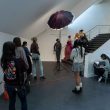
The Glitch Mob ain’t no one track pony. Glitch hop, a genre they’re often credited with inventing (or at least popularizing), may have put them on the map, but they refuse to churn out cookie cutter, assembly line club bangers. Drink the Sea, their first fully original full-length, is bound to confound expectations. On the one hand, there are certainly distinctive characteristics that make the record recognizably Glitch Mob. On the other, Sea sees them abandoning many of their signature bells and whistles most notably the stutter edits suggested by their moniker.
“We’re not really trying to be leaders of any specific social scene or movement, we’re just trying to make music that we like. There has definitely been a polarization. We have this word in the name of our band, which never really had a specific genre attached to it. When we first started the band, it wasn’t really supposed to be a reference to ‘glitch hop’ or ‘glitch music’ or anything. When we chose the name, it was kind of tongue-in-cheek. We had to pick a name. At the time, we were really into glitching out music and using different high-tech effects plug-ins, really just chopping the fuck out of everything,” explains Mobster Justin Boreta.
That initial sound caught on like wildfire. Within a year or two of their official Shambhala debut, sardine fests were the norm and not the exception. Remix requests poured in left and right. The Mobsters could barely keep up with their grueling touring and producing schedule. Sets started to get a bit repetitive. Some longtime fans experienced ear fatigue, getting burnt out on the outfit. Then again, virgin ears were easy to come by. Still, a musical sea change was in order. It seems Sea was brewing.
“In order to prepare ourselves to write the record, we initiated an exercise called ‘Song Clubs’. Every day, for an entire month, we’d each knock out a track and drop it in a network folder. We’d experiment with different sounds and textures. We did that for awhile. Once we had a direction in mind that we really liked, that’s when we actually sat down, scrapped all the ideas and started from scratch. We didn’t recycle anything, we started from the ground up. The record’s actual gestation period was about nine months.”

Sea is not a perpetual party. Sure, there are a handful of dance floor dandies. “We Swarm,” the tune that soundtracks their Southern California Bigfoot Sighting clip on YouTube, could uproot the stubbornest wallflower, but “We Swarm” isn’t the norm. “Between Two Points,” Sea‘s only singer-assisted number (Swan is the siren behind said pipes), and “Starve The Ego, Feed The Soul” are both downtempo gems.
“The whole album was already finished. We didn’t even plan to have any vocals on it. Swan’s actually just a good friend of ours who lives nearby. We invited her over to vocalize for sampling purposes. Turns out she had lyrics that she’d written. We had no idea, but it was amazing.”
Calling Sea a headphone record is a no-brainer. How will it fare in the live realm? Find out this Saturday, May 29, at Red Rocks when they’ll join Booka Shade and others in support of Disco Biscuits. Those familiar with The Mob’s formerly laptop-dependent stage rig will be pleasantly surprised by the recent incorporation of an acoustic drum set, keyboards and electronic drum pads, not to mention the Lemur touchscreen controllers showcased at last year’s Monolith swan song.




